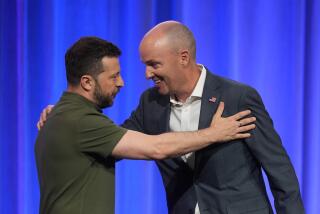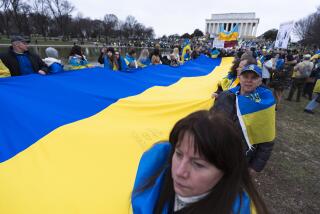Nixon Urges U.S. to Assist Commonwealth
- Share via
WASHINGTON — Declaring that the Western democracies have yet to win the Cold War, former President Richard M. Nixon said Wednesday that the United States must lead the world in providing massive aid, perhaps $20 billion a year, to the former Soviet republics or risk confrontation with a new generation of despots.
While Nixon avoided direct criticism of the Bush Administration, the former President’s remarks seemed implicitly to rebuke an American foreign policy constrained by election-year politics and a growing tide of isolationism.
“It is true that as far as the Cold War is concerned, the Communists lost. It is not true that the Free World has won,” Nixon told 200 scholars, diplomats and government officials assembled for a foreign policy conference sponsored by the Richard Nixon Library & Birthplace in Yorba Linda, Calif.
“Now freedom is on trial, and if freedom does not work,” Nixon said, the former Soviet republics “will return . . . to what I would call a new despotism . . . (that) could be a far more dangerous threat to peace and freedom in the world . . . than was the old Soviet totalitarianism.”
Earlier, Bush told reporters that he generally agrees with Nixon’s views, outlined in a private memorandum, the contents of which were published by the New York Times earlier this week. The memo has been widely interpreted as chiding Bush and Secretary of State James A. Baker III for failing to offer the former Soviet Union more aid more quickly.
At a morning news conference, Bush acknowledged that he and Nixon differ on some points. “There isn’t a lot of money around. We are spending too much as it already is,” the President said. “So to do the things I would really like to do--I don’t have a blank check for all of that. And so in that area, there may be a slight difference.”
Nixon’s sentiments were echoed Wednesday by Sen. Sam Nunn (D-Ga.), chairman of the Senate Armed Services Committee, and Robert Strauss, U.S. ambassador to Russia.
Nunn, one of several senators who recently returned from a trip to Russia and Ukraine, said he will recommend that the United States quickly recognize each former Soviet republic as a sovereign nation, remove U.S. trade restrictions and encourage U.S. business to invest.
He also urged the Administration to begin marshaling support from other industrial nations for a Western-financed fund to help stabilize the ruble--a move that many analysts believe is essential before Russia can move to a free-market economy.
On Capitol Hill, Strauss expressed shock that the issue of aid to the republics has been virtually ignored in this year’s presidential campaign.
“People do have the notion . . . that we have won the Cold War, and we can relax and all share in this peace dividend, and, of course, nothing can be further from the truth,” he said. “Democracy and freedom is on trial as it’s never been . . . before. . . .”
Congress has appropriated about $500 million in aid for the Commonwealth of Independent States, as the former Soviet Union is known. About $400 million would be used to help dismantle nuclear weapons; the rest would be for humanitarian aid. The Administration also has authorized agricultural loan credits valued at about $5 billion.
During a brief meeting with reporters after his speech, Nixon said he is not seeking to criticize Bush but to “focus attention on what I consider to be the major foreign policy issue of our time.”
Nixon said he realizes that Bush “has to be concerned about the political effect” of spending large sums abroad but added that “it is possible for a President, if he believes strongly, as President Bush does, it is possible for him to mobilize public opinion for something that is not just in the interests of the world, not just of Russia, but more in our interest.”
Nixon endorsed a program of aid to Russia and the other former republics that would include access to the International Monetary Fund, open markets for their goods, financial support to stabilize the ruble and humanitarian aid. Nixon said: “The major burden for meeting the needs that Russia has . . . must be carried by the countries in Europe and Japan that we helped after World War II. But the United States is the richest and strongest nation in the world, and we must provide the leadership.”
Nixon, 79, who has not made a major policy address in Washington in years, also took aim at the growing isolationist sentiment aroused by the troubled economy and right-wing political candidates, including his own former speech writer, Patrick J. Buchanan.
“Even some of those who have been the strongest supporters of a strong foreign policy role for the United States now say it’s time to turn our efforts inward. . . .
“What they fail to realize is that foreign and domestic policy are like Siamese twins: Neither can survive without the other. . . . We can’t be at peace in a world of wars, and we can’t have a healthy American economy in a sick world economy.”
Orange County developer George Argyros, who attended the conference, said he thought Nixon’s speech was “terrific and very timely.”
“I think it’s important that the American people think about it,” Argyros said. “We have not completed our job, and that is the very point (Nixon) makes. It is our moment in history here, and we need to (handle) it properly . . . to make sure that freedom succeeds.”
Times staff writers Art Pine and Norman Kempster contributed to this report.
More to Read
Get the L.A. Times Politics newsletter
Deeply reported insights into legislation, politics and policy from Sacramento, Washington and beyond. In your inbox twice per week.
You may occasionally receive promotional content from the Los Angeles Times.







